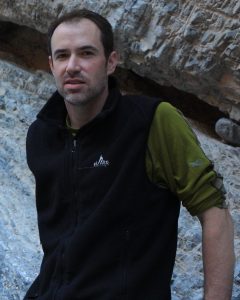4 September 2018
WASHINGTON, D.C. – Journalists Shannon Hall and Douglas Fox have been awarded top honors from the American Geophysical Union for their reporting in the Earth and space sciences.
AGU recognizes freelance journalist Shannon Hall with the 2018 David Perlman Award for Excellence in Science Journalism – News for her story about the role of plate tectonics in determining the habitability of exoplanets. Freelance journalist Douglas Fox receives the 2018 Walter Sullivan Award for Excellence in Science Journalism – Features for an in-depth story on the science of wildfire.
The David Perlman Award, named for the retired San Francisco Chronicle science editor, recognizes excellence in science news writing published with deadline pressure of one week or less. Hall has been named the winner of the 2018 award for her story, “Earth’s Tectonic Activity May Be Crucial for Life – and Rare in Our Galaxy,” published in Scientific American on 20 July 2017. The award comes with a $5,000 prize and a plaque.
Hall’s story describes an overlooked factor in determining the habitability of an alien planet: whether it has plate tectonics, which can regulate atmospheric temperatures and compositions in important ways. Hall’s piece explores a marriage of exoplanet science and geophysics in what might be called exogeology. She speaks to the scientists performing exoplanet formation simulations and finds that, based on the chemistry of the exoplanets’ parent stars, only a third of them might have plate tectonics for any length of time – potentially bad news for alien life. She explains clearly how the new study tries to account for composition, unlike studies from a decade ago, which only accounted for the exoplanet’s size. Hall spoke to three relevant sources for the story and assimilated related studies in just a few days of reporting. The article was found in an original search through the arXiv, a preprint repository.
The Perlman Award Committee appreciated that “Hall was blazing a path in an untilled area of science – identifying and executing a story without the benefit of a journal tip sheet or a university press release.” They noted the author’s confidence in explaining concepts from two completely different fields – plate tectonics and exoplanet science – without resorting to jargon or skimping on the science.
Hall’s story is “a terrific exploration of a new, vibrant topic and its implications for very big issues in understanding other worlds and whether they might have life,” noted one committee member. Another committee member said the article presents a surprising new side of the search for planets that can support life. The article is an “interesting and clearly told tale of why plate tectonics may be important for life and the birth of a new discipline, exogeology,” the committee member said. “It’s well-rounded, with several outside voices commenting on the study’s implications and limitations, and it looks both backward to what could be called the initial paper in the field and forward to what scientists hope to do next.”
Douglas Fox receives the 2018 Walter Sullivan Award for his story, “Firestorm,” published in High Country News on 3 April 2017. The Water Sullivan Award, named for the late New York Times science writer, honors excellence in science feature writing for work prepared with a deadline of more than one week. The award comes with a $5,000 prize and a plaque. Fox also won the Sullivan Award in 2015.
Fox’s story is a timely and gripping account of the science of wildfire, opening in Idaho during the busy fire season of 2016 before traveling back to Hamburg, Germany in 1943, where bombs dropped from World War II airplanes ignited an intense conflagration that quickly engulfed the city. The mechanism responsible for the intensity of the Hamburg fire remained an enigma until decades later when researchers studying urban blazes observed that vertical plumes increased the burn rate on the ground. Returning to the current period of frequent wildfire in the U.S., Fox reports on how scientists used this cold war era discovery to develop a new understanding of the dynamics of modern-day wildfire. Weaved through this account are the stories of the scientists who study fire and the firefighters who battle these blazes across the west.
The committee was unanimous in praising the quality of the writing, with one noting that it felt as though they were “reading a very captivating novel.” Reflecting its rich and engaging narrative, one committee member said the article “beginning to end, told a strong story.” Several committee members commented that the carefully researched piece not only captured scientific aspects of wildfire but that it also made these understandable to the general public. One committee member remarked that “the science was very good, and it conveyed the subject well to a non-expert.” The committee noted that the article makes masterful use of characters to illustrate a scientific investigation process marked by persistence, serendipity and adventure. As one member commented, “if you are not excited about science yet, you will be after reading this piece.”
The two AGU journalism awards will be formally presented during AGU’s annual Honors Ceremony on Wednesday, 12 December 2018, as part of the 2018 AGU Fall Meeting in Washington, D.C.
###
The American Geophysical Union is dedicated to advancing the Earth and space sciences for the benefit of humanity through its scholarly publications, conferences, and outreach programs. AGU is a not-for-profit, professional, scientific organization representing more than 60,000 members in 139 countries. Join the conversation on Facebook, Twitter, YouTube, and our other social media channels.
Nanci Bompey
+1 (202) 777-7524
[email protected]

